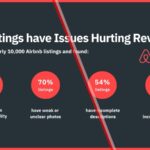New York City welcomed nearly 63 million visitors in 2024, generating over $74 billion in economic impact. It is the second-largest city tourism market globally, behind only London. When a city of that scale reconsiders how short-term rentals are regulated, the implications reach far beyond its five boroughs.
Two years after Local Law 18 effectively eliminated most short-term rentals in New York, a new proposal, Intro. 1107, has reopened the debate. For professional short-term rental managers outside the city, the story is not about whether you operate in Brooklyn or the Bronx. It’s about how the most restrictive STR law in the U.S. is being tested, and what lessons this fight offers for markets around the world.
From Local Law 18 to Intro. 1107
When Local Law 18 (LL18) took effect in September 2023, the impact was immediate: short-term rental listings dropped by over 90%. The law made it illegal to rent out an entire unit for less than 30 days, required the permanent resident to be physically present, and capped guests at two people at a time.
The intent was to free up housing and bring affordability relief. Two years on, the results are contested. Airbnb and its coalition partners argue that rents have continued to rise and hotel prices have climbed despite the law, evidence, they say, that LL18 has failed. Tenant advocates counter that these trends reflect broader market pressures and warn against drawing direct cause-and-effect conclusions.
In late 2024, a group of City Council members introduced Intro. 1107 as a reform bill.
Their framing is that Intro. 1107 offers “modest reforms” to help primary homeowners, particularly in Black and Latino neighborhoods, earn income without taking housing off the market. This aligns with the coalition narrative that Airbnb has amplified — that Local Law 18 disproportionately hurt marginalized communities and small businesses in the outer boroughs.
| Proposed Change | What It Means | Why Supporters Say It’s Needed |
| Allow homeowners in 1–2 family dwellings to rent while away | Primary residents wouldn’t need to be physically present during the guest stay. | Gives middle-class homeowners flexibility to travel or work away while still earning income. Helps families in Black and Latino neighborhoods who rely on hosting to pay mortgages and stay in their communities. |
| Raise guest cap from 2 → 4 | Increases the maximum number of short-term guests allowed in a home at one time. | Makes hosting more viable for families and small groups (parents + kids, visiting relatives). Supporters argue this aligns with how most travelers already use STRs and helps keep NYC affordable for visitors. |
| Clarify “common household” rules | Hosts must provide guests with “reasonable access” to the home but can keep private rooms (bedrooms, offices) off-limits. | Addresses privacy and safety concerns. Supporters say LL18’s rules were overly burdensome and deterred responsible hosting. |
| Framed as “modest reforms,” not a rollback | Keeps key safeguards: registration, owner-occupied rules, and limits on commercial operators. | Council sponsors and coalition partners argue this helps homeowners without opening the door to large-scale investor activity. |
Most of the sponsors represent outer-borough districts with high concentrations of Black and Latino homeowners, aligning with the demographics of the coalition groups supporting the bill:
- Farah Louis (Brooklyn) and Mercedes Narcisse (Brooklyn), both representing heavily Black and Caribbean neighborhoods where homeownership is central to household wealth.
- Kevin Riley (Bronx), Althea Stevens (Bronx), and Rafael Salamanca Jr. (Bronx), who have argued that their districts are bearing the brunt of affordability pressures.
- Oswald Feliz (Bronx), a former tenant lawyer who has walked a fine line between affordability protections and supporting homeowners.
- Selvena Brooks-Powers (Queens) and Diana Ayala (Manhattan/Bronx), both with ties to working-class communities affected by rising costs.
The Case For and Against Intro. 1107
Supporters’ case (Airbnb and coalition groups): LL18 failed to lower rents or improve vacancy rates. Instead, it hurt small businesses in the outer boroughs, reduced income for middle-class homeowners, and made NYC less affordable for families visiting the city. Civil rights and business organizations, from the NAACP to chambers of commerce, have joined the call for change.
Opponents’ case (tenant rights groups and several City Council members): Intro. 1107 is a step backward. They argue it could incentivize landlords to prioritize tourists over tenants and undo gains made since stricter enforcement began in 2023. Over 300 tenants and advocates recently rallied outside City Hall against the bill, warning that it could reignite speculative pressure on housing.
Airbnb’s Lobbying Push in New York
The debate is no longer confined to City Hall. Airbnb has committed $5 million to New York’s 2025 elections, becoming the city’s largest political spender. A SuperPAC funded by the company launched $1 million in attack ads against mayoral candidates critical of short-term rentals.
Airbnb’s Coalition and Housing Partnerships
Beyond lobbying, Airbnb is signaling it wants to be seen as part of the housing solution.
In September 2025, Airbnb announced a $1 million multi-year partnership with Neighborhood Housing Services of NYC (NHSNYC), a nonprofit with a 40-year history of supporting low- and moderate-income residents. The initiative is framed around housing stability and economic opportunity, providing foreclosure prevention and financial counseling services.
This move runs parallel to Airbnb’s broader coalition-building. Civil rights groups such as the NAACP (Brooklyn and Jamaica branches), the New York Urban League, and multiple borough chambers of commerce have aligned with City Council sponsors of Intro. 1107. Their shared narrative: Local Law 18 disproportionately harmed Black and Latino homeowners and outer-borough small businesses.
When combined with Airbnb’s steady stream of commissioned economic impact reports, in the U.S. and abroad, the message is clear. Airbnb is countering housing shortage criticisms by positioning itself as a partner in affordability, racial equity, and small business survival. For critics, these alliances reflect calculated self-interest; for Airbnb, they are proof that it represents more than just a tech platform. That it is a coalition of homeowners, communities, and local businesses.
Airbnb’s Balancing Act
Airbnb’s public stance has shifted notably over the past decade. During the first Trump administration, the company was one of the most visible corporate critics of White House policies, opposing the travel ban, offering free housing to refugees, and even running its “#WeAccept” Super Bowl ad as a pointed response. Its founders condemned family separation policies as “heartless, cruel, and immoral,” underscoring the brand’s progressive positioning at the time.
Today, the tone is more measured. Around New York, the company is emphasizing “modest reforms”, income opportunities for homeowners, support for small businesses, and economic stability in Black and Latino neighborhoods, rather than sweeping values-driven campaigns.
At the same time, Airbnb has had to navigate reputational challenges: co-founder Joe Gebbia, now less involved in operations, has taken on a role in Donald Trump’s Department of Government Efficiency (DOGE), sparking backlash from some hosts and criticism that sits uneasily alongside Airbnb’s coalition with civil rights and housing groups. The company has distanced itself from Gebbia’s DOGE work, but the contrast highlights the careful line Airbnb is walking.
Airbnb’s evolution from outspoken progressive to careful coalition-builder in NYC shows how strategy adapts when survival in a critical market is at stake, and how external associations can complicate that positioning.
Why NYC Matters Globally
For cities around the world, New York serves as a regulatory test case:
- If the strictest law softens: Policymakers in Boston, Los Angeles, Paris, and Barcelona will watch closely. It could signal that even aggressive restrictions can bend under pressure.
- Narrative strategies travel: The competing frames, “housing justice vs. small business survival”, will show up in other markets. Airbnb’s coalition-building with civil rights groups and small businesses is a playbook likely to be reused elsewhere.
- Political dynamics matter: Airbnb’s direct election spending in NYC is a new phase of advocacy. Whether it helps or backfires (as seen in Zohran Mamdani’s mayoral primary win) will shape how platforms approach politics globally.
What STR Managers Should Take Away
For professional managers outside New York, this moment is less about the specifics of LL18 or Intro. 1107, and more about the patterns:
- Regulation is fluid: Rules can shift dramatically in just two years, from a near-total clampdown to potential reforms. Stay ready for volatility.
- Public engagement counts: Tenant groups and platforms are setting the narrative in public. Managers who provide data, case studies, and testimonies about responsible operations can influence how their business model is perceived.
- Affordability is the frame: Around the world, debates are being tied to affordability, equity, and small business resilience. Positioning STRs as part of those solutions, rather than in conflict with them, will be key.
Closing Thought
Intro. 1107 may not pass as written. But the fact that New York is reconsidering reforms so soon after one of the strictest STR laws in the world is significant. For managers, the lesson is clear: what happens in New York rarely stays in New York.
Uvika Wahi is the Editor at RSU by PriceLabs, where she leads news coverage and analysis for professional short-term rental managers. She writes on Airbnb, Booking.com, Vrbo, regulations, and industry trends, helping managers make informed business decisions. Uvika also presents at global industry events such as SCALE, VITUR, and Direct Booking Success Summit.








